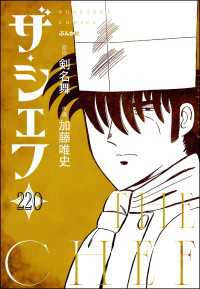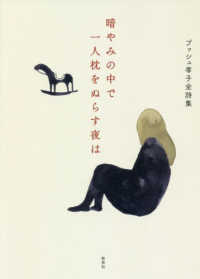- ホーム
- > 洋書
- > 英文書
- > Business / Economics
Full Description
This book takes as its subject the intensely private discussions that arise when ordinary people confront life and death choices and struggle with decisions in a world of medical and scientific complexity. Laurie Zoloth began her work in bioethics in a large public California hospital system, where she was part of a group tasked with the creation of an ethics committee in every hospital in the system, that would hear hundreds of cases every year, including pediatric cases from the hospital's intensive care, neonatal intensive care, burn, and oncology units.
The book explores the dilemmas presented in these cases and reflects on the competing, often incommensurate moral appeals offered by the participants. It then analyzes the cases against and with similar concepts within Jewish thought, using rabbinic texts to make legible the factors at play as one makes ethical judgments. This philosophical position is feminist as it considers and at times advocates for the inclusion of family and community in the rationale of the clinical setting. Intertwined with legal statements in the Talmud are aggadot, or midrashic texts, literary narratives used to argue a point, or to complicate a point, or to deepen the meaning of the communal discourse, adding history, case studies, or fictive tales to the discussion. Zoloth argues that these texts can be usefully applied to problems in bioethics. She develops the case for a textual turn that is fully imagined and enriched by the many possible re-interpretations of narrative: biblical, rabbinic, medieval, modern, and post-modern.
Contents
Acknowledgments
Introduction: Writing a Jewish Bioethics
Chapter 1: The Duty of Repair in a Broken World
Chapter 2: Thinking as Interrupted Conversation
Chapter 3: Suffering and its Uselessness
Chapter 4: Seeing the Doubting Judge
Chapter 5: How to be Good
Chapter 6: In Case
Chapter 7: Trading in Futures
Chapter 8: The Full Onus of Mercy
Chapter 9: Duty Bound
Chapter 10: Making the Things of the World
Chapter 11: Ordinary Talk about Ordinary Trouble
Conclusion






